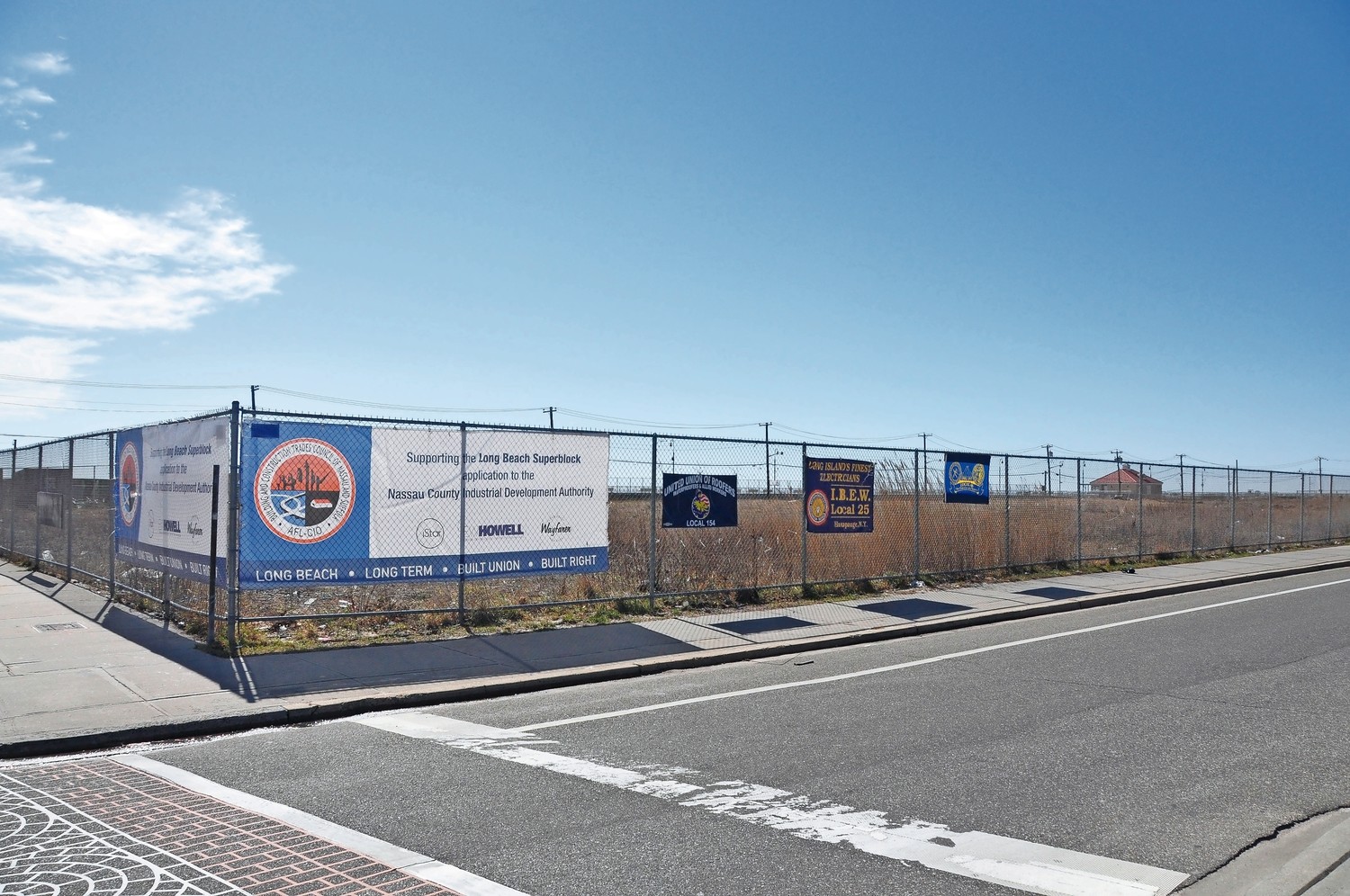Zoning board to hold hearing over Long Beach Superblock
April 10 public meeting to determine whether iStar permit is still valid
The city’s Zoning Board of Appeals will hold a public hearing on Tuesday, April 10, to determine whether a building permit it granted to the developer of the Superblock property was still valid and whether a variance had expired.
The meeting, which was scheduled at the zoning board’s meeting on Thursday, comes after a Nassau County State Supreme Court judge ordered the board in January to hold a hearing within 90 days to determine whether the variance and building permit granted to the developer, iStar FM Loans, in 2014 and 2015, respectively, were still valid. The hearing will be held at City Hall at 7 p.m.
City officials declined to comment on Friday.
As the Herald reported in January, the ruling came after a group of Long Beach residents, represented by former U.S. Sen. Alfonse D’Amato, filed a lawsuit against the zoning board last year in an attempt to overturn a variance and permit that were issued to the developer.
The lawsuit sought to revoke a building permit that was issued to Shore Road Long Beach Superblock LLC, a subsidiary of iStar, in May 2015, which the suit claimed was invalid because the variance, issued in 2014, had expired. It also sought to force the zoning board to hold a public hearing.
“I expect that the citizens of Long Beach will turn out and let their opinions be known that this is a developer who, to say the least, is a stranger to the truth,” D’Amato told the Herald. “They made promises and they broke them. They promised to start construction 90 days after the [zoning board] decision was final, and they waited well over a year to come before the [Nassau County Industrial Development Agency] and ask for an outrageous, $120 million tax subsidy.”
In his ruling, Judge Stephen Bucaria denied both the city’s and Shore Road’s motions to dismiss the case, and said that the board had 90 days to hold a public hearing to determine whether the permit and variance were still valid, a decision that could impact the future of the project. But Bucaria also denied the plaintiff’s request to declare the building permit and variance void until the board held its hearing.
“It is for the Zoning Board of Appeals, rather than this court, to determine in the first instance whether the granting of the variances were complied with, and whether the time period for obtaining all necessary permits should be extended,” Bucaria wrote.
The zoning board said on the city’s website that attorneys and representatives for both sides will have “unlimited” time to speak, while the public will have a strict three-minute time limit to address the board.
Residents James Kirklin, Michael and Rianna Goldshall, and Boguslaw Pawlowicz, Republican former City Councilwoman Mona Goodman and the Republican slate of candidates who ran for City Council last year — Leah Tozer, Christopher Jones and William Haas — filed the lawsuit on Aug. 3 against the city’s Zoning Board of Appeals, its building commissioner, Scott Kemins, and Shore Road.
In February 2014, the zoning board voted 5-1 to grant iStar a height and density variance to develop a mixed residential and commercial development on the six-acre parcel between Riverside and Long Beach boulevards, East Broadway and the boardwalk, saying that it would revitalize property that has remained vacant for 30 years.
The proposed project includes two 15-story buildings — roughly 50 feet taller than the city’s height limit of 110 feet — with 522 one- and two-bedroom luxury rental apartments and 11,000 square feet of retail space for a handful of shops along the boardwalk. IStar told zoning board trustees that it had the financial wherewithal to move forward with the project, which it said would generate $4.8 million in property taxes.
The developer sought approval for the variance after the City Council voted to settle a city lawsuit against the developer for $5.25 million in 2014, the terms of which included the city’s support for a payment in lieu of taxes, or PILOT, program for an unspecified term.
But after the board granted the variance, the developer faced a swift backlash from residents after it began pursuing tax breaks from the Nassau County Industrial Development Agency, claiming it could not move forward with the project without a PILOT.
The IDA rejected two requests by iStar for tax abatements, including a 20-year, $109 million proposal in 2016, amid an outcry from D’Amato and residents who maintained that the city would lose out on the full tax benefits of the development.
According to the suit, iStar was required to obtain the necessary permits within nine months of the zoning board’s approval and commence construction within a year, or the variance would be revoked. In November 2014, the zoning board granted iStar an extension until the following May.
The developer filed an application that spring for a permit to begin work on the foundation only, city officials said, and on May 28, 2015, it received approval from Kemins to start that work. According to the complaint, the Building Department granted iStar at least two extensions for the foundation permit, though the lawsuit claims that no construction plans were submitted for the towers.
Last June, Kirklin, who lives on Riverside Boulevard, near the property, appealed the Building Department’s most recent year-long extension, issued last year — to run through May 2018 — arguing that iStar was no longer entitled to the permit and would have to go before the zoning board to obtain a new variance.
iStar has threatened to sue the city for $105 million, claiming the city's support for the developer's request for a PILOT was insufficient.
“The city went well beyond what they should of to accommodate them,” D’Amato said. “[iStar] didn’t tell the truth to the zoning board — they never told the zoning board that they needed or would require financial assistance.”






